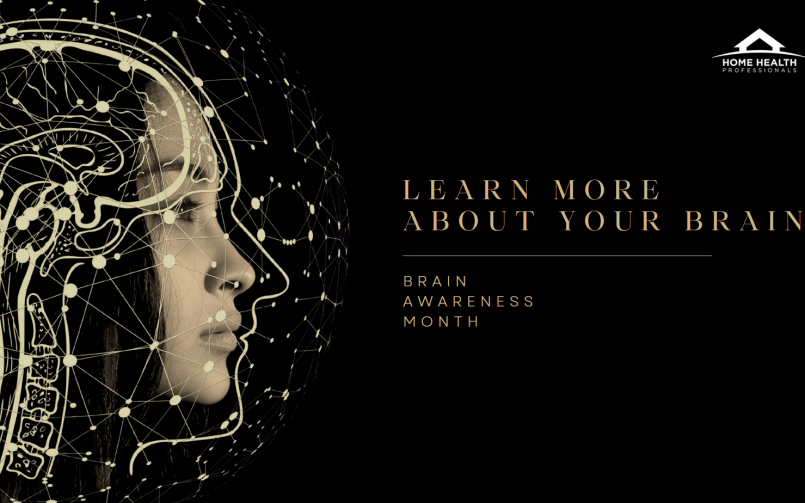
Learn More About Your Brain!
This month plays host to Brain Awareness week; however, brain health is always important to Home Health Professionals and our patients. The brain is the source of many serious ailments such as Parkinson’s Disease, Dementia, Alzheimer’s Disease, Epilepsy, and Strokes. So, we thought it was important to inform you more about the brain, its functions, how it matures, and taking steps to exercise your brain.
Learning more about the brain can help you make more informed decisions about your health. So, let’s start with learning a little more about how your brain is constructed. The brain is made up of 60% fat, with the remaining 40% being a combination of water, protein, carbohydrates, and salts. White brain matter makes up much of the inner section of the brain. Gray matter makes up the outer portion of the brain. The gray matter of the brain is responsible for processing and interpreting information. White matter in the brain sends information to other parts of the nervous system. The average brain weighs about 3 lbs and has five major parts including:
- Cerebrum
- Cerebellum
- Brain Stem
- Pituitary Gland
- Hypothalamus
The cerebrum, or front of the brain, is the largest part of the brain. It regulates body temperature, coordinates movement, and enables speech, judgment, thinking and reasoning, emotions, learning, and problem-solving.
The cerebellum is located at the back of the head. This portion is responsible for maintaining posture, voluntary muscle movements, equilibrium, and balance.
The body’s brain stem connects the spinal cord and the brain. The brain stem is vital for your survival. This portion of the brain oversees all involuntary muscles, digestion, circulating blood, breathing air, and so much more.
The pituitary gland is sometimes called the “master gland.” This pea-sized gland is responsible for the function of all other glands in the body and the regulation of hormones. The pituitary gland works in conjunction with the hypothalamus by receiving chemical signals through its stalk and blood supply.
Finally, the hypothalamus is the pituitary gland’s neighbor as it is located right above the gland. This portion of the brain regulates body temperature, controls both hunger and thirst, helps to synchronize sleep patterns, and plays a role in memory and emotion.
Brain awareness has important implications for your health and wellness. Understanding the brain can help you make informed decisions about diet, exercise, sleep, stress management, and other lifestyle factors affecting brain health. It can also help you recognize the signs and symptoms of brain disorders and seek appropriate treatment. Overall, brain awareness is an important aspect of promoting individual and public health, and it is essential for improving our understanding of both ourselves and the world around us.
If your loved one has experienced one of these major ailments such as Parkinson’s Disease, Dementia, Alzheimer’s Disease, Epilepsy, or a stroke, home health might be the best treatment for you. Through medication management and neurological rehabilitation, our nurses and therapists can help you on your way to recovery. Ease your burden by allowing our professionals to come to you. Call us at (713) 942-0100 for more information on how Home Health Professionals can help you.
You must be logged in to post a comment.